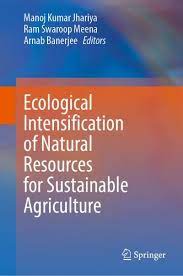Ecological
intensification involves using natural resources such as land, water, soil
nutrients, and other biotic and abiotic variables in a sustainable way to
achieve high performance and efficiency in agricultural yield with minimal
damage to the agroecosystems. With increasing food demand there is high
pressure on agricultural systems. The concept of ecological intensification
presents the mechanisms of ensuring high agricultural productivity by
restoration the soil health and landscape ecosystem services. The approach
involves the replacement of anthropogenic inputs with eco-friendly and
sustainable alternates. Effective ecological intensification requires an
understanding of ecosystems services, ecosystem's components, and flow of
resources in the agroecosystems. Also, awareness of land use patterns,
socio-economic factors, and needs of the farmer community plays a crucial role.
It is therefore essential to understand the interaction of ecosystem
constituents within the extensive agricultural landscape. The editors
critically examined the status of ecological stress in agroecosystems and
address the issue of ecological intensification for natural resources
management. Drawing upon research and examples from around the world, the book
is offering an up-to-date account, and insight into the approaches that can be
put in practice for poly-cropping systems and landscape-scale management to
increase the stability of agricultural production systems to achieve
‘Ecological resilience’. It further discusses the role of farmer communities
and the importance of their awareness about the issues. This book will be
of interest to teachers, researchers, climate change scientists, capacity
builders, and policymakers. Also, the book serves as additional reading
material for undergraduate and graduate students of agriculture, forestry,
ecology, agronomy, soil science, and environmental sciences. National and
international agricultural scientists, policymakers will also find this to be a
useful read for green future.



Ecological Intensification of Natural Resources for Sustainable Agriculture
06/02/23 09:40AM
Manoj Kumar Jhariya, Ram Swaroop Meena, Arnab Banerjee (eds.). Switzerland, Springer, 2021, 655p.978-981-33-4203-3


